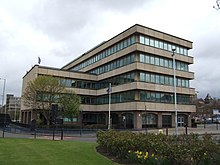Carillion
Concerns about Carillion's debt situation were raised in 2015, and after the company experienced financial difficulties in 2017, it went into compulsory liquidation on 15 January 2018, the most drastic procedure in UK insolvency law, with liabilities of almost £7 billion.
[27] Carillion acquired 100% of the Outland Group, a specialist supplier of camps and catering at remote locations in Canada, in May 2015[28][29] and a majority stake in Ask Real Estate, a Manchester-based developer, in January 2016.
[32] In July 2014, Carillion was one of eight businesses involved in the 2014 launch of the Construction Workers Compensation Scheme,[33] though this was condemned as a "PR stunt" by the GMB union, and described by the Scottish Affairs Select Committee as "an act of bad faith".
[74] The liquidation announcement had an immediate impact on 30,000 subcontractors and suppliers, Carillion employees, apprentices and pensioners, plus shareholders, lenders, joint venture partners and customers in the UK, Canada and other countries.
[81] In late March 2018, Bury North MP James Frith hosted a meeting in Parliament attended by suppliers affected by Carillion's collapse; companies highlighted unpaid debts of between £250,000 and £2.7M.
[90] Four companies in Lagan Construction Group went into administration owing £21M in early March 2018 partly as a result of Carillion's insolvency; tightened credit terms and requests for upfront payments had affected cashflow.
[92] Cheshire-based civil engineering contractor D G Cummins lost £1.8M owed by Carillion for work undertaken on the M6 motorway widening contract junctions 16–19, and, facing a £600,000 tax demand, had to file a notice of intent to enter administration, endangering 50 jobs.
[98] In September 2019, Antrim-based electrical subcontractor Blackbourne ceased trading, making 86 staff redundant, partly due to Carillion debts incurred on the Royal Liverpool University Hospital project.
[72] In parallel, 13,945 jobs had been safeguarded through transfers (76% of the pre-liquidation workforce), while 1,274 employees left the business through finding new work, retirement or for other reasons;[72] a year after the liquidation, the total number of redundancies was reported as 3,038.
[166] However, in June 2018, banks financing the project withdrew their support, and HM Treasury cancelled the PFI contract for construction of the hospital, leaving the NHS Trust to search for new investment and pushing the completion date back to at least 2022.
[171][172] On 24 September 2018, it was reported that the government would step in to terminate the PFI deal, taking the hospital into full public ownership, meaning a £180M loss for private sector lenders Legal & General and the European Investment Bank.
The report warned of possible further significant cost increases, particularly to rectify the badly built Liverpool project, and blamed Carillion for pricing the jobs too low to meet specifications.
[230] On 30 July 2018, it was announced that Carillion Canada's highway operations in Alberta and Ontario had been sold to Emcon Services Inc.[231] There were immediate calls for a public inquiry from politicians and financial analysts in the United Kingdom.
[233][234] The company's liquidation raised political questions about the award of UK Government contracts to a financially troubled business, and about Private Finance Initiative projects and wider privatisation of public services.
[251] In 6 February hearings, Carillion directors blamed the company's collapse on problem contracts (including two hospital PFI projects – in Liverpool and Birmingham – with cost overruns), high levels of debt arising from the 2011 acquisition of Eaga,[252] plus Brexit, the 2017 General Election and interest rates.
)[258] MPs on the two select committees also discussed documents showing that Carillion investor Standard Life had expressed concerns over the company's financial management, strategy and corporate governance in 2015.
We heard variously that this was the fault of the Bank of England, the foreign exchange markets, advisers, Brexit, the snap election, investors, suppliers, the construction industry, the business culture of the Middle East and professional designers of concrete beams.
[260][261] Published correspondence between shareholders (including Kiltearn, Standard Life and Letko Brosseau) – described as "fleeing for the hills" – and Carillion showed repeated efforts to raise issues with directors[262] with the interim CEO Keith Cochrane said to have only a vague grasp of finances.
"[271] Zafar Khan's successor as finance director, Emma Mercer, was also reported to have voiced concerns about accounting irregularities in April 2017 and at a board meeting on 9 May 2017 which received legal advice from Slaughter and May.
[272][273] After further documentation and correspondence was published by the select committees, Carillion directors bosses were described by MPs as "fantasists" chasing "a pot of gold",[274] with chairman Philip Green described by Rachel Reeves as having "either a woeful lack of leadership or no grip on reality.
"[277] Interviewed by the joint Business and Work and Pensions Committee on 7 March 2018, key Carillion investors Aberdeen Standard Investments, Kiltearn and Blackrock said the board focused more on their own pay than the company's performance, and questioned KPMG's auditing of the 2016 accounts.
[279] PricewaterhouseCoopers told the Work and Pensions Select Committee on 21 March 2018 that its services over the first eight weeks of the liquidation had cost £20.4M;[280] this followed MPs' accusations that PwC had been attempting "to milk the Carillion cow dry".
[74] Two days before 16 May 2018 publication of the parliamentary inquiry report, Frank Field said Carillion had "displayed utter contempt for its suppliers", using them to "prop up a failing business model" and conceal true levels of debt.
[301] It criticised the government for not identifying that Carillion was financially struggling long before its January 2018 collapse, saying its "traffic light" system of warnings (rating suppliers as green, amber, red, plus black for 'High Risk' status) was "too slow and clunky".
In a report published on 9 July 2018,[305] the committee said ministers tried to spend as little money as possible; it often did not fully understand the risks it was transferring to private companies, and failed to appreciate differences in quality provided by rival bidders because procurement decisions were driven by price.
[333] At the disciplinary hearing in January 2022, KPMG's UK chief executive Jon Holt said the firm had discovered misconduct by it staff in its own internal investigations, and immediately reported it to the FRC.
[354] In October 2023, the FRC fined KPMG £21 million for its mishandling of Carillion's accounts,[355] saying it had failed to follow "the most basic and fundamental audit concepts" and an "unusually large number of breaches" had been found.
[377] Other outsourcing businesses also came under scrutiny: Capita announced a profit warning on 31 January 2018;[378] Serco and Mitie were called to give evidence to Parliament's Public Administration and Constitutional Affairs Select Committee on 8 May 2018;[379] while Kier's financial position was likened to Carillion's in September 2018.
[408] Its subsidiary Clinicenta had a contract to run a treatment centre at Lister Hospital in Stevenage which was terminated in 2013, after the Care Quality Commission found the unit was not meeting minimum standards.
[412] In March 2022, faulty construction by Carillion of Network Rail drainage measures adjacent to a Scottish railway line in 2011-12 was blamed as a significant factor in the Stonehaven derailment, an accident on 12 August 2020 which killed three people.






